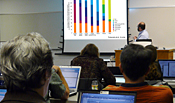You are here
Fellowship Supports Graduate Student to Study Link between Ocean Acidification and Harmful Algal Blooms
Rachel Golda is a recipient of the EPA Science to Achieve Results (STAR) Fellowship for Graduate Environmental Study.
 The U.S. Environmental Protection Agency’s National Center for Environmental Research started the STAR program in 1995 to help address the Nation’s need for trained professionals in scientific, technical, engineering and mathematical (STEM) fields. The goal of the program is to encourage promising students to pursue advanced degrees, and ultimately careers, in environmental fields.
The U.S. Environmental Protection Agency’s National Center for Environmental Research started the STAR program in 1995 to help address the Nation’s need for trained professionals in scientific, technical, engineering and mathematical (STEM) fields. The goal of the program is to encourage promising students to pursue advanced degrees, and ultimately careers, in environmental fields.
Golda is a Ph.D. student studying environmental science in the Center for Coastal Margin Observation & Prediction (CMOP) at Oregon Health & Science University’s Institute of Environmental Health. Working with her advisors, Drs. Tawnya Peterson and Joseph Needoba, Golda’s project focuses on identifying links between anthropogenically driven ocean acidification and the dynamics of different estuarine phytoplankton. Improving our understanding of these links will help develop strategies for better managing and protecting marine and estuarine ecosystems from harmful algal blooms, which in turn can threaten human and environmental health, and the economic vitality of coastal communities.
Golda is committed to a career focused on preservation of coastal and estuarine ecosystems by reducing human impacts on coastal environments through results-driven science. “After graduation I would like to continue to explore algal toxin dynamics in the Pacific Northwest, perhaps working with a federal agency,” says Golda.
“Rachel’s work highlights some of the direct links that exist between environmental science and human health, an emerging area of interest within OHSU’s Institute of Environmental Health,” says Peterson. Needoba adds, “Her project combines elements of electronics, aquatic chemistry, and cell culturing techniques that allow her to tackle the complex question of how increased atmospheric CO2 can lead to human health concerns. Her dedication to working through the challenges of the experimental setup has led to her EPA fellowship that will allow her to thoroughly investigate the link between ocean acidification and an increase in algal toxins in the environment and the marine food chain.”
Golda earned her Master of Science degree in environmental science and engineering from OHSU and an undergraduate degree in biology from Saint Martin’s University. She previously received the Robert E. Malouf Marine Studies Scholarship in 2012 for her research in ocean acidification and harmful algal blooms.
Written by Amy Johnson. Photo taken by Jeff Schilling.






